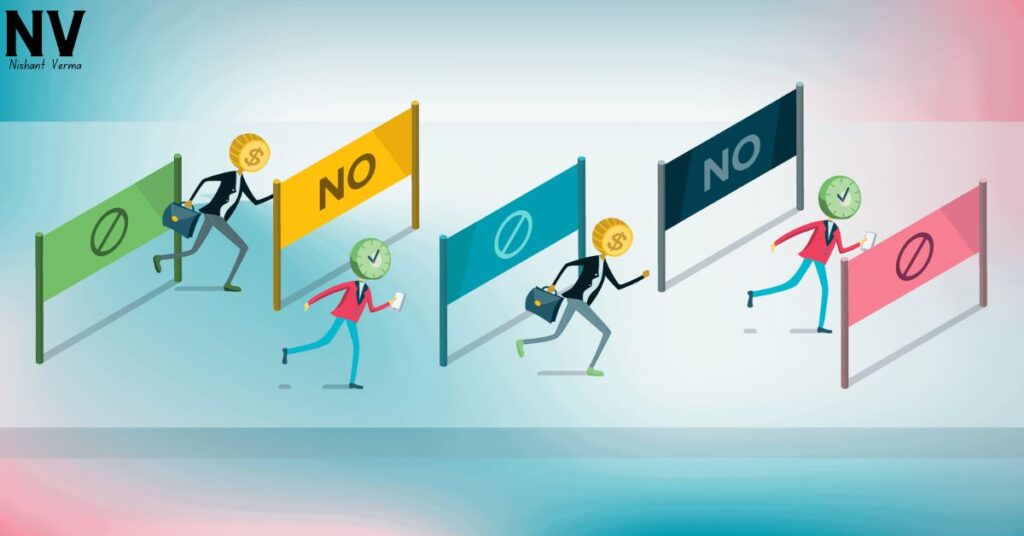Selling things can sometimes be like trying to convince your friend to share their favourite toy with you. They might say things like, “I don’t want to share,” or “I want to keep it for myself.” In the world of selling, these are called objections – reasons why someone might not want to buy what you’re offering. But don’t worry, overcoming objections is like finding a way for your friend to share their toy happily. In this article, we’ll explore easy and simple strategies for Overcoming sales objections and making more successful deals.

Understanding Overcoming sales objections:
Imagine you’re asking a friend to join you in a game, and they say, “I don’t have time.” That’s an objection – a reason they don’t want to do what you’re suggesting. Overcoming sales objections are like roadblocks that can come up when you’re trying to sell something. It could be about the price, the product, or maybe the timing. The first step is to understand why the person is objecting. Listen carefully, just like you would with your friends, to figure out what’s stopping them.
Empathizing with Customers:
When your friend says they don’t want to share, you might say, “I understand; it’s your favourite toy.” In Overcoming sales objections, showing understanding is crucial. Empathizing with customers concerns. Maybe they think the product is too expensive, or they’re unsure if it will meet their needs. By saying, “I get it, budget is important,” or “I want to make sure this is perfect for you,” you show them that you care about what they’re thinking.
Being Prepared:
If you know your friend usually doesn’t like sharing, you might bring extra toys to exchange. In sales, being prepared means knowing the common objections and having answers ready. If customers often say, “It’s too expensive,” be ready to explain the value they’re getting. If they say, “I need to think about it,” have reasons ready why it’s a good idea now. Being prepared helps you tackle objections smoothly.
Highlighting Benefits:
When you convince your friend to share their toy, you might say, “If you share, we can play together longer.” In Overcoming sales objections, it’s essential to highlight the benefits. If the customer says, “I’m not sure it’s worth it,” show them how your product or service will make their life better. Focus on what they gain, not just what they spend.

Building Trust:
Your friend is more likely to share their toy if they building trust you. In sales, building trust is just as important. Share positive experiences from other customers, explain your product’s quality, and be honest about what it can and can’t do. Trust makes objections less scary because customers feel confident in your honesty.
Handling Price Objections:
Price objections are like when your friend says, “I can’t afford to lose any toys.” You might say, “What if we trade toys for a short time?” In Overcoming sales objections, if someone says, “It’s too expensive,” you could suggest payment plan discounts or show them the long-term value. Help them see it’s an investment, not just a cost.
Alternative Offerings:
If your friend insists on keeping their toy, you might say, “How about we play with my toys today?” In sales objections, if the main product is a no-go, alternative offerings. Maybe there’s a smaller version, a different color, or a special promotion. Providing options helps find a solution that works for both of you.

Closing the Deal:
When your friend agrees to share, it’s like closing the deal. In sales, closing is the final step. Once you’ve handled objections, ask for the sale. You might say, “So, are you ready to give it a try?” Make it easy for them to say yes and celebrate the agreement.
Conclusion:
Overcoming sales objections is akin to navigating through the twists and turns of convincing your friend to share their favorite toy. By understanding objections, empathizing with customers, being prepared, highlighting benefits, building trust, handling price objections wisely, offering alternatives, and closing the deal with finesse, you transform objections into opportunities. These simple and effective strategies not only lead to successful sales but also create a positive experience for both you and your customers. Remember, it’s not just about selling; it’s about finding solutions that bring joy and satisfaction to everyone involved.




